Blog The Alliance joins Africa Agricultural Extension Week
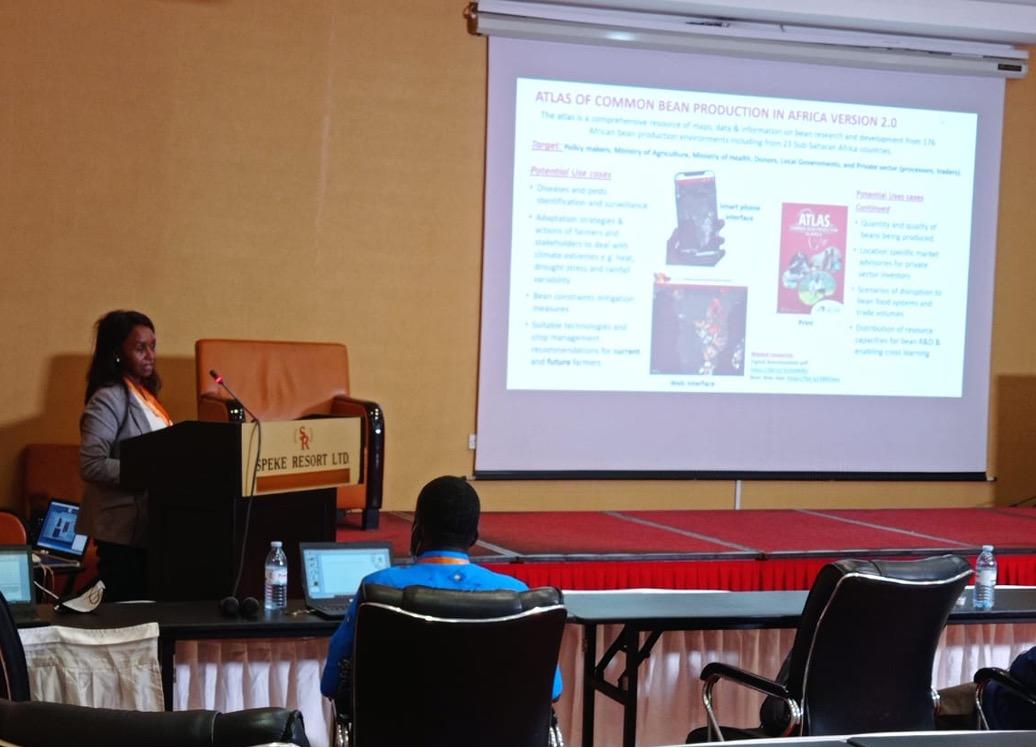
The Alliance of Bioversity International and CIAT, jointly with other CGIAR institutions (AfricaRice, IITA, ILRI, CIP) actively participated in the 5th Africa Agricultural Extension Week (AAEW) held at Speke Resort Munyonyo, Kampala Uganda between 14-20th November 2021. AAEW is a continental event and held every two years since 2013. It is a platform that allows dialogue on new developments, emerging needs in capacity building and defining strategic direction in agricultural extension and advisory services.
This year’s event was organized by the African Forum for Agricultural Advisory Services (AFAAS) and the Ministry of Agriculture, Animal Industry and Fisheries of Uganda. The objective of the event was to deliberate on strategic issues in agricultural extension and advisory services (AEAS) in Africa. The theme of the event was “Effective Agricultural Extension Systems for Sustainable Agripreneurship in Africa”. It was organized into five strands:
1) Innovative AEAS approaches for resilient and practical actions.
2) Towards professionalism of AEAS systems in Africa: where are we?
3) Agro-industrialization in the context of trade regime: implications for AEAS.
4) Harnessing agripreneurship opportunities for youth and women.
5) AEAS resilience to pandemics and emergences: lessons across Africa.
Under the framework of OneCGIAR, a side event was spearheaded by AfricaRice with participation from the Alliance of Bioversity International and CIAT. More than 50 participants participated in the side event which included a talk by Dr Harold Roy-Macauley, OneCGIAR Regional Director, East and Southern Africa (ESA). In attendance were representatives from the Ministry of Agriculture, National Agricultural Research Institute, academic institutions, research institutions, development agencies, the private sector and agricultural extension agencies and service providers.
Dr Roy-Macauley highlighted the role of OneCGIAR in transforming food systems, presenting its research and innovation strategy. Regarding East and Southern Africa, he noted that OneCGIAR will consolidate existing collaborative efforts, including the partnership with the extension support frameworks, through new modes of engagement involving a single focal point leadership. This would ensure engagement and monitoring of strategic partnerships and co- development of country strategic frameworks based on alignment of capacities and resources within the CGIAR centers and funder interests.
The CGIAR scientists in Uganda presented some of their innovations targeting seed systems, digital applications and agripreneurship opportunities that are facilitating extension work in the region. From the Alliance of Bioversity International and CIAT, four innovations were showcased including: the Tumaini App for identification of banana diseases; the Atlas of common bean production in Africa version 2; the Mastercard Farmer Network (MFN); and community seed banks.
Tumaini
The Tumaini Mobile App is a free mobile phone app for identification of major banana diseases and a pest. This banana disease app also provides practical advice for managing the disease. Tumaini app, currently in five languages will help extension staff and banana farmers to correctly identify banana diseases, improve disease surveillance and management. The app has currently and directly benefitted over 5,000 banana farmers and there are ongoing efforts to empower extension staff and farmers on its use in East and Central Africa, as well as to apply it to diseases of other crops.
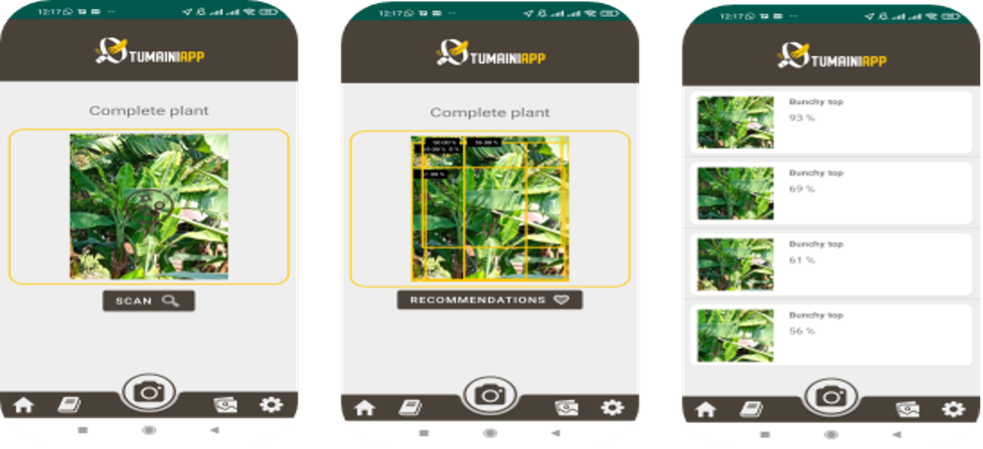
Tumaini app for identification of major banana diseases
The Bean Atlas
The Bean Atlas app for common bean production in Africa is a comprehensive resource of maps, data and information on bean research and development from 176 African bean production environments including from 23 Sub-Saharan Africa countries. This app is useful for a broad range of actors including policy makers, sectors of agriculture and health, private sector processors and traders, researchers, academics and donors.
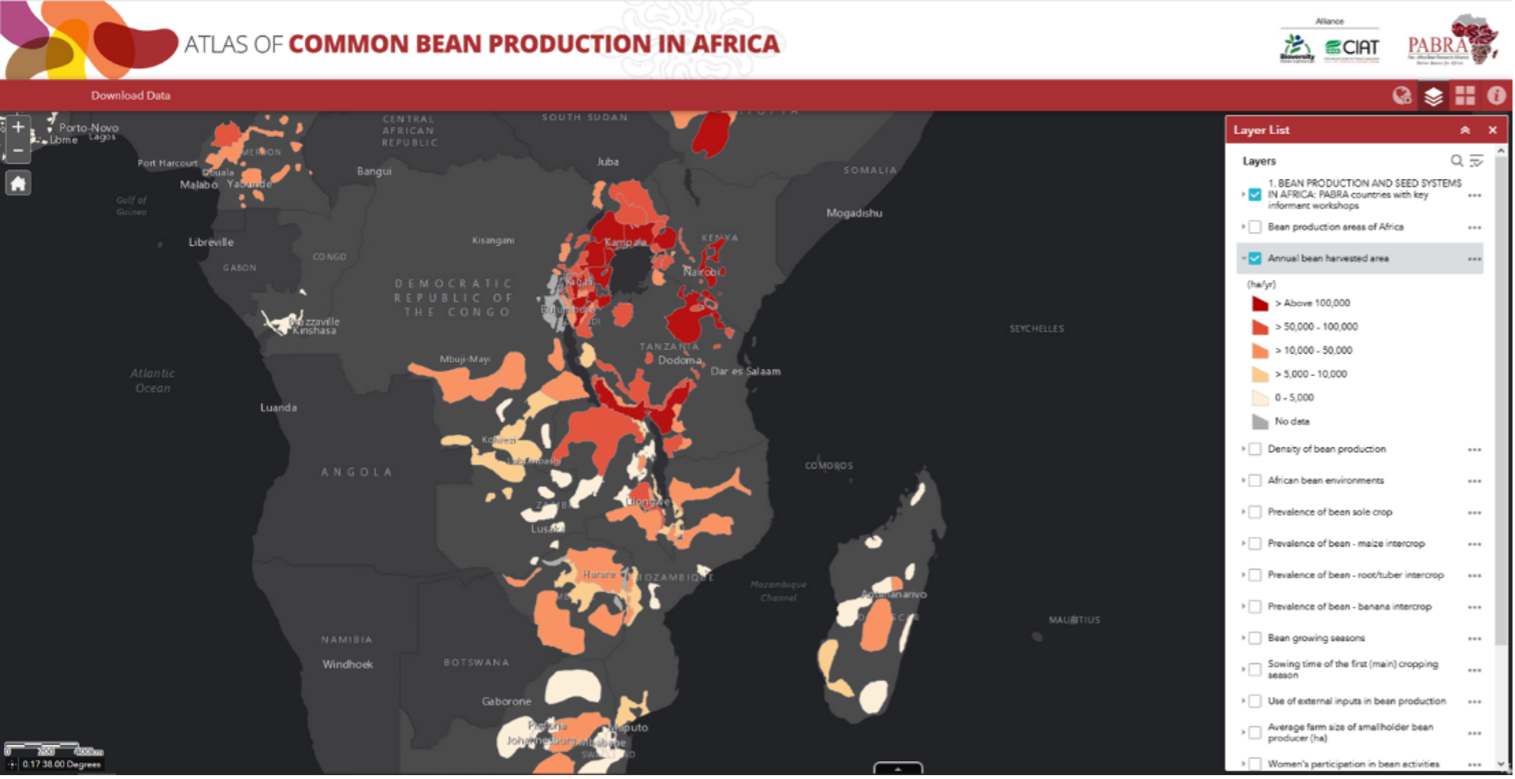
Bean Atlas app for common bean production in Africa
Mastercard Farmers Network
The Mastercard Farmers Network (MFN) app digitizes marketplaces, payments, workflows, and farmer financial histories, increasing farmer linkages to markets and formal financial services. The platform links smallholder farmers to reliable markets and buyers to sustainable sources of quality produce for multiple crops. This digital marketplace app promotes youth and women empowerment with 75% of agents being youth and 50% being women. The digital marketplace ensures payments for produce go directly to mobile phones, giving women phone owners greater autonomy of their income. MFN has been piloted in Uganda and Tanzania, benefiting over 360,000 farmers.
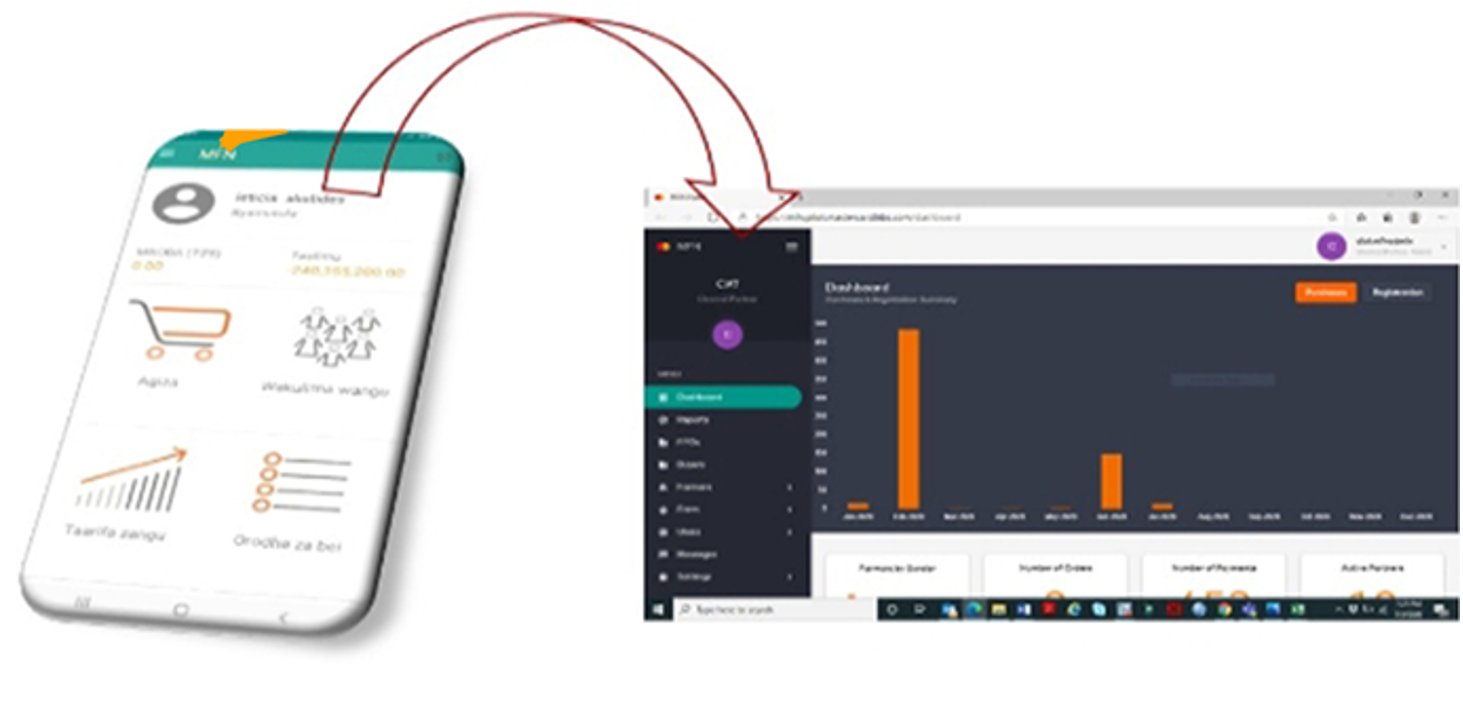
The Mastercard Farmer Network (MFN) app for linking smallholder farmers to reliable markets & buyers across crops
Community Seedbanks
Community seedbanks (CSBs) are locally established institutions to conserve and share seeds of crop varieties adapted to prevailing climate conditions and biotic stresses. Out of seven CSBs established in ESA, four have registered seed cooperatives and two comprising 300 farmers produce and sale quality declared seeds (QDS) of beans within local communities. Over 60% of QDS producers are women. Youths are also involved in marketing of seeds for some of the seed producers. Through working with CSBs extension staff can ensure timely access of seed, marketing of produce and improved livelihoods.
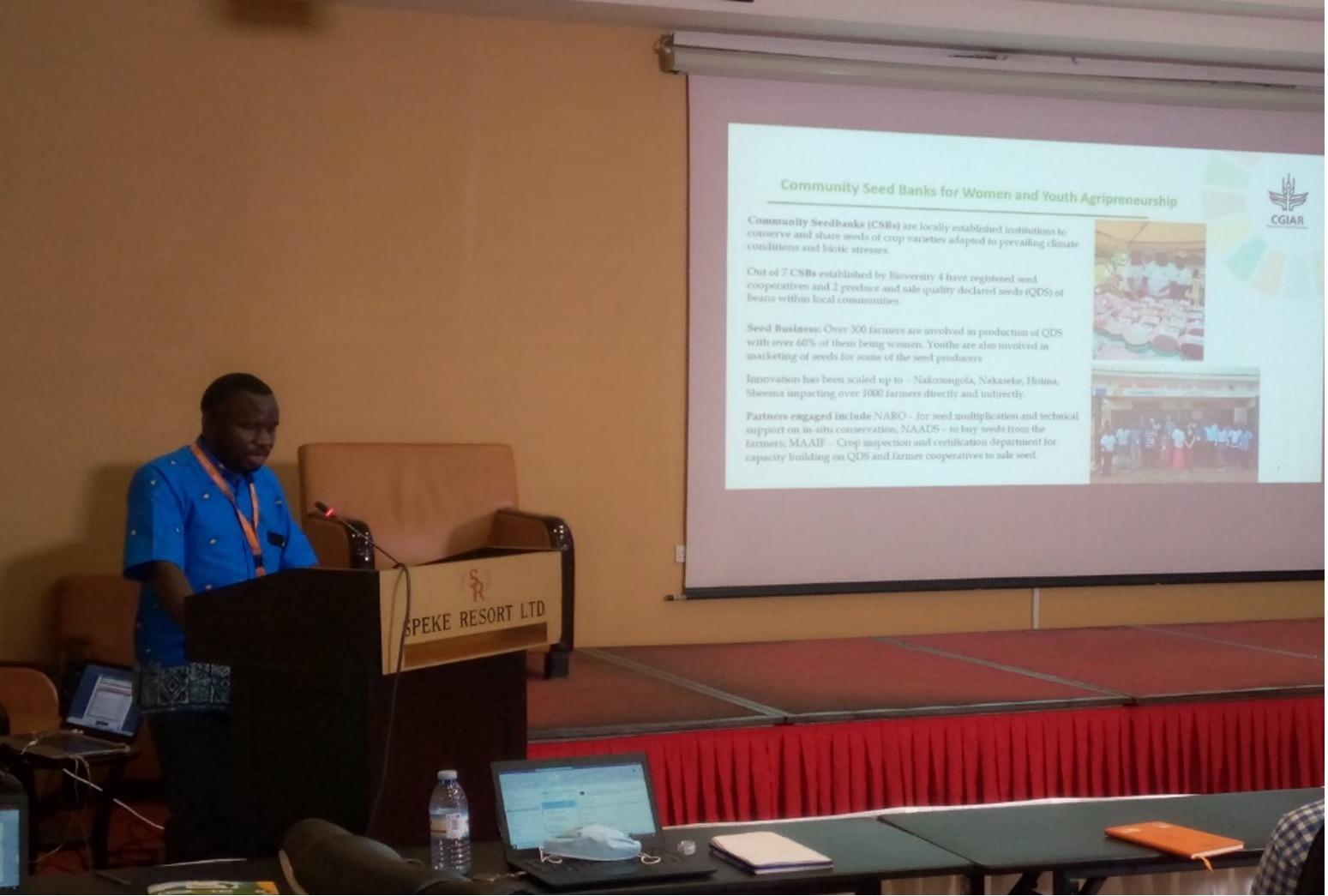
Walter Ocimati presenting community seed banks as one of the innovations by the Alliance.
The question-and-answer session after the presentation sought clarifications about the OneCGIAR structure, inclusiveness, scalability and partnerships surrounding the innovations. Several recommendations were generated including pulling investments from the private sector to finance the innovations; scaling out of innovations particularly to NARs, creation of partnerships with government and local governance to ensure empowerment and sustainability of innovations and influencing policy on the use of digital platforms in educational sectors.
The event enabled sharing of experiences and learning, and strengthened fruitful partnerships between policymakers, researchers, and investors.
Acknowledgements
Several institutions/organizations including the private sector, government agencies, research and development institutions and learning institutions partnered with CGIAR in the development of the above innovations. We acknowledge the contributions of Equity bank, Yo Uganda, Enabel, Kaderes, EADC, CEDO, Mastercard Foudation, National research institutions in Uganda and Tanzania, donors notably Global Affairs Canada, the Swiss Development Cooperation, CGIAR Funders through the Roots Tubers and Banana programme and CGIAR Platform for Big Data in Agriculture, and MAAIF Uganda.
Additional contributors: Fred Kato, Susan Ajambo & Walter Ocimati
